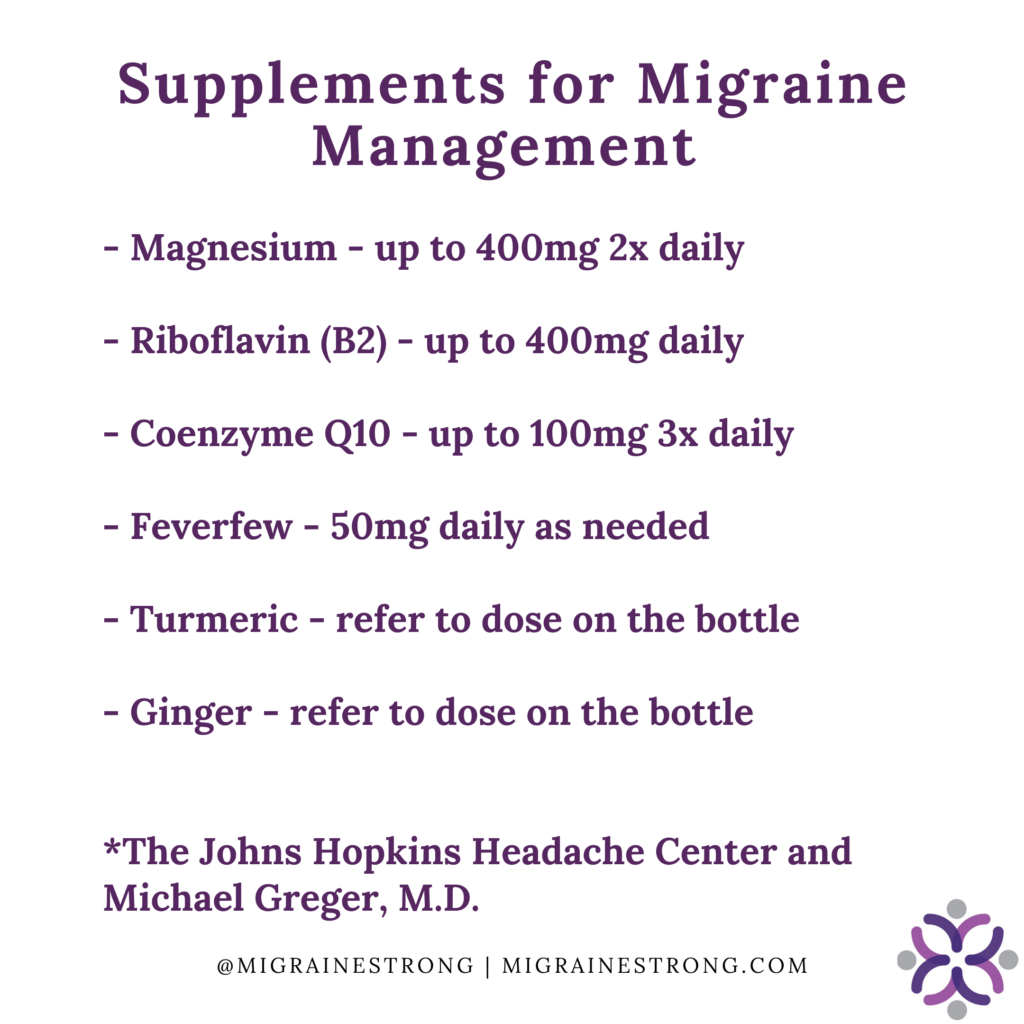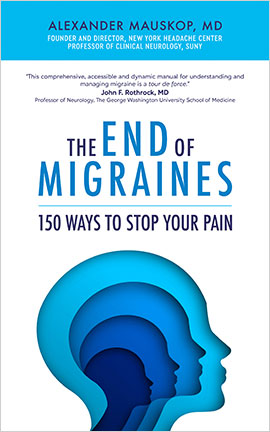Turmeric is often celebrated for its powerful anti-inflammatory, anti-fungal, and pain-relieving properties—some even tout its potential cancer-fighting abilities. But can it play a role in easing headaches and especially for those living with migraine?
While migraine is primarily a genetic neurological condition and not traditionally linked to inflammation, emerging research suggests there may be a neurogenic inflammatory component involved during attacks. This growing area of interest has led researchers to explore whether reducing that inflammation could help manage migraine symptoms.
That’s where turmeric may come in.
In this article, we’ll explore what science currently says about turmeric’s potential to support migraine and tension headache relief—and whether it could be a helpful part of your treatment strategy.
While Migraine Strong writes about the latest in migraine treatments, this is not medical advice. We are patient educators and all information you read should be discussed with your doctor.
Turmeric and Migraines: What You Should Know
Turmeric is a flowering plant from the ginger family—and yes, it shares a lot of the same benefits as its spicy cousin. Like ginger, turmeric is often used to help manage pain and inflammation, which is why it’s becoming a popular natural remedy for migraine relief.
Native to Asia, India, and Central America, turmeric is widely grown and commonly used as a spice in cooking. It has a warm, slightly bitter, and earthy flavor, and it’s best known for giving curry its vibrant golden-yellow color (and often shows up as a natural food coloring, too).
But here’s the twist: while turmeric steals the spotlight, it’s actually curcumin—the active compound inside turmeric—that does the heavy lifting. Curcumin is packed with powerful anti-inflammatory and antioxidant properties, which can play a big role in easing migraine symptoms. The catch? Turmeric root only contains about 3% curcumin by weight, which means it’s tough to get enough just by sprinkling it on your dinner.
That’s where curcumin supplements come in. Adding a high-quality curcumin supplement* to your routine, alongside a turmeric-rich diet, can help you tap into the full benefits—more on how to do that effectively a little later.
*See our note of caution at the end of this article, but ALL supplements should be reviewed with your physician before you start.
How Turmeric May Help Relieve Migraine Symptoms
Turmeric (and its active compound, curcumin) may support migraine relief in several key ways:
- Fights Inflammation Naturally
Turmeric is a powerful natural anti-inflammatory, which can help reduce chronic pain without the side effects or risks of addictive medications. Perhaps it helps with the neuroinflammation associated with migraine. (2) - Reduces Oxidative Stress
Curcumin helps combat oxidative stress by boosting your body’s antioxidant defenses—important for anyone dealing with inflammation or chronic illness like migraine. (3) - Supports Brain Health
Some studies suggest curcumin may improve cognitive function and reduce the risk of neurodegenerative diseases, offering long-term brain health benefits.(4) In another study, working memory was improved with curcumin supplementation. (9) What person living with migraine wouldn’t welcome that nice benefit? - Improves Circulation and Histamine Response
Better blood flow means more oxygen to the brain, which may help reduce symptoms like brain fog, tinnitus, and even histamine-related reactions. (5)
Is turmeric for headaches and migraine well-researched?
Honestly, the study links above are not directly related to turmeric for migraine and not all of the studies are on humans. Like most supplements, research on using turmeric for migraines is pretty limited.
The jury is still out on just how much turmeric can improve our symptoms. But, even if it’s simply a reduction of the number of attacks you experience each month or a reduction in the severity of symptoms you experience during an attack it’s an interesting spice to explore.
There are many studies available that support turmeric’s pain fighting abilities like this one managing arthritis pain with daily turmeric use. (6.)
I also came across a small Iranian study that found a reduction in frequency of migraine attacks when turmeric and omega-3 fatty acids were taken together as a daily migraine preventive. (7.) Yet another small study that showed turmeric can increase the effectiveness of naproxen. Since naproxen is my abortive of choice, I can’t wait to try this one out myself during my next painful attack. (8.)
Should you consider a supplement that has only a few studies for migraine use?
Many experts believe neurogenic inflammation plays a role in migraine disease. Over the counter anti-inflammatory NSAIDS like naproxen and ibuprofen are used very successfully to treat migraine attacks. So with its anti-inflammatory benefit, it’s not that big of a jump to consider turmeric for the management of migraine pain even with little research supporting it. Especially for those who are looking for natural migraine relief.
This makes me think of Dr. Geppetti’s talk on multi-modal treatment approach at the 2019 Migraine World Summit. In his talk he stated that because most of us have migraine for many years, we should try everything reasonable to gain control over our symptoms. Not necessarily everything proven or well-studied but, everything rational. Personally, I consider it reasonable to try a supplement with so many health benefits standing behind it.
In a recently published must-read book by Dr. Alexander Mauskop, prominent headache specialist, founder and director of NY Headache Center, specifically discusses curcumin as one of the “150 Ways to Stop Your Pain.” He uses it himself for the potential cognitive benefits.
I have personally supplemented with turmeric for many years and believe it helps gently calm down my inflammatory response, soothing my pain and reducing dizziness and ear symptoms related to vestibular migraine. One thing I’ve learned when it comes to managing migraine symptoms is to stick with what works even if no one else is talking about it or doing it.
Continue what’s effective and rewarding for you personally. If it works, I keep going! Logically it just makes sense to me to consider turmeric’s studied benefits and try applying their effectiveness for migraine use.
How to Boost Turmeric Absorption for Better Migraine Relief
Turmeric is processed very quickly through the digestive tract making it difficult to absorb into the bloodstream. But there are two things you can do to help increase its absorption.
- Make sure your supplement contains black pepper, cayenne pepper or chili powder. Each contain an active ingredient called piperine. Piperine is a strong anti-inflammatory and antioxidant in its own right, but its main benefit here is that it boosts the absorption of curcumin.
- Curcumin is fat soluble so combining it with a meal high in healthy fat or taking it alongside a bit of healthy fat like ghee, olive oil or an Omega 3 supplement will increase absorption as well.
Ways to get turmeric
In cooking– If you prefer not to supplement, you can use turmeric spice in countless ways to incorporate it into your diet. Turmeric is an easy spice to add into scrambled eggs, smoothies, tuna salad, roasted vegetables, meats and so much more. So, get creative with this one.
Tea– As mentioned turmeric has a pungent flavor. I find mixing it with other herbs or spices to be the most pleasing way to ingest it. The Republic of Tea makes a couple of yummy teas. One is called Organic Turmeric Ginger Green Tea. The other is Biodynamic Turmeric Cinnamon that I add a pinch of black pepper and honey to. I really love this tea because it contains only cinnamon & turmeric. Look for any tea brand with few ingredients like theirs.
Golden milk or turmeric latte– is turmeric and other spices heated with warm milk. Generally, a dairy free milk like rice, oat or coconut is used, but you can use any milk you like. Preferably full fat to help absorption. Migraine Strong Facebook group moderator Sally Platt shared her delicious recipe for “turmeric tea” with us. On the stove top simmer 1 cup of rice milk, 1 cup of water, 2 decaf green tea bags, ½ teaspoon ground turmeric, ½ teaspoon ground ginger, a pinch of black or cayenne pepper, a teaspoon of honey (or maple syrup) and a teaspoon of ghee. If you tolerate lemon add a squeeze and enjoy.
Supplement– In Migraine Strong we often share the supplement recommendations of Johns Hopkins and Dr. Michael Greger. While we have yet to find it in writing, some members of Migraine Strong who see doctors in the Johns Hopkins headache center have reported they recommend supplementing with turmeric and see patients who are having success with it.
This along with our own success, has lead us to recently add it to our list of supplements to consider discussing with your doctor. Members of Migraine Strong have reported using Gaia Herbs Turmeric Supreme, Turmeric Supreme Pain or Pure Encapsulations Curcumin. You can receive a discount on your purchase through Migraine Strong’s supplements dispensary where you’ll also find more turmeric brand options. Look for brands that conduct third party testing to verify their supplements contain the amounts listed on the label.
A Word of Caution
Proceed carefully when taking any supplements. Turmeric is used to treat gastrointestinal disorders but, even so it can cause mild tummy upset to more severe conditions especially at high doses in some people.
I found no research that ensures the safety of taking high doses of turmeric for an extended period of time. In addition, not everyone is a good candidate for taking turmeric. Turmeric can contribute to bleeding disorders, kidney stones, iron deficiency and more. Those who are pregnant or nursing should avoid supplementing with turmeric.
Turmeric can also thin the blood, so, discontinue use before surgery. It’s so important to consider possible drug interactions. Many supplements can interfere with medications and other underlying health conditions. Please never start a supplement on your own based on articles like ours. Go see your primary care doctor and/or neurologist for advice. We recommend running EVERY supplement you consider taking by your doctor for approval.
References:
- https://www.ncbi.nlm.nih.gov/pmc/articles/PMC4888678/
- https://www.ncbi.nlm.nih.gov/pmc/articles/PMC5664031/
- https://www.ncbi.nlm.nih.gov/pmc/articles/PMC5674483/
- https://www.ncbi.nlm.nih.gov/pmc/articles/PMC3281036/
- https://www.ncbi.nlm.nih.gov/pmc/articles/PMC5310664/
- https://www.ncbi.nlm.nih.gov/pmc/articles/PMC5003001/
- https://pubmed.ncbi.nlm.nih.gov/29237386/
- https://www.ncbi.nlm.nih.gov/pmc/articles/PMC6636407/
- https://pmc.ncbi.nlm.nih.gov/articles/PMC8708668/



One can also drink cold pressed curcuma juice. Mixed with some ginger juice it is delicious and even better for migraine prevention.
This seems to just add more to the confusion!!! Throughout the article sometimes it says to take Curcumin and other times it says to take Turmeric! Which is it???